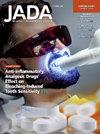Summary of the Veterans Health Administration’s First International Symposium on Artificial Intelligence in Dentistry
IF 3.5
2区 医学
Q1 DENTISTRY, ORAL SURGERY & MEDICINE
引用次数: 0
Abstract
Background
The Veterans Health Administration’s First International Symposium on Artificial Intelligence in Dentistry, held virtually on October 11, 2024, marked a step toward improving oral health care for veterans through the adoption of cutting-edge artificial intelligence (AI) technologies. AI offers the potential to transform dental diagnostics, treatment planning, and care delivery; however, its clinical application in dentistry remains limited. The symposium addressed this gap by means of highlighting innovations and implementation strategies to help clinicians prepare for the technological changes reshaping oral health care.
Types of Studies Reviewed
The authors summarized presentations and panel discussions from the symposium, encompassing developments in AI-assisted cariology, maxillofacial radiology, diagnostic and presurgical planning, clinical workflows, remote monitoring, and the ethical and regulatory landscape. The review is based on content submitted by the symposium’s presenters, reflecting their research, operational experience, and emerging innovations.
Results
The presentations established that AI technologies can standardize diagnostics, reduce interoperator variability, and enhance clinical decision making through predictive analytics, digital simulations, and multimodal data integration. AI applications exhibited high specificity in detecting pathologies, improved early intervention capabilities, and optimized treatment planning. Key findings emphasized the value of responsible AI adoption within institutional settings, such as the US Department of Veterans Affairs, supported by means of clinician engagement, regulatory guidance, and ethical oversight.
Conclusions and Practical Implications
Integrating AI into dental practice can improve diagnostic accuracy, streamline administrative processes, and enhance access to care. These tools offer substantial benefits for large health care systems, such as the Veterans Health Administration, including greater efficiency, personalization of treatment, and improved outcomes, particularly in underserved or resource-limited environments.
退伍军人健康管理局首届牙科人工智能国际研讨会综述
退伍军人健康管理局于2024年10月11日虚拟举行了首届牙科人工智能国际研讨会,标志着通过采用尖端人工智能(AI)技术改善退伍军人口腔保健迈出了一步。人工智能提供了改变牙科诊断、治疗计划和护理提供的潜力;然而,其在牙科的临床应用仍然有限。研讨会通过强调创新和实施战略来解决这一差距,以帮助临床医生为重塑口腔卫生保健的技术变革做好准备。作者总结了研讨会上的演讲和小组讨论,包括人工智能辅助龋齿学、颌面放射学、诊断和术前规划、临床工作流程、远程监测以及伦理和监管领域的发展。该审查基于研讨会主持人提交的内容,反映了他们的研究、操作经验和新兴创新。结果:通过预测分析、数字模拟和多模式数据集成,人工智能技术可以使诊断标准化,减少操作员之间的差异,并增强临床决策。人工智能应用在检测病理、提高早期干预能力和优化治疗计划方面表现出高特异性。主要发现强调了在美国退伍军人事务部等机构环境中,在临床医生参与、监管指导和道德监督的支持下,负责任地采用人工智能的价值。结论和实践意义将人工智能集成到牙科实践中可以提高诊断准确性,简化管理流程,并增加护理的可及性。这些工具为退伍军人健康管理局等大型卫生保健系统提供了实质性的好处,包括提高效率、个性化治疗和改善结果,特别是在服务不足或资源有限的环境中。
本文章由计算机程序翻译,如有差异,请以英文原文为准。
求助全文
约1分钟内获得全文
求助全文
来源期刊

Journal of the American Dental Association
医学-牙科与口腔外科
CiteScore
5.30
自引率
10.30%
发文量
221
审稿时长
34 days
期刊介绍:
There is not a single source or solution to help dentists in their quest for lifelong learning, improving dental practice, and dental well-being. JADA+, along with The Journal of the American Dental Association, is striving to do just that, bringing together practical content covering dentistry topics and procedures to help dentists—both general dentists and specialists—provide better patient care and improve oral health and well-being. This is a work in progress; as we add more content, covering more topics of interest, it will continue to expand, becoming an ever-more essential source of oral health knowledge.
 求助内容:
求助内容: 应助结果提醒方式:
应助结果提醒方式:


